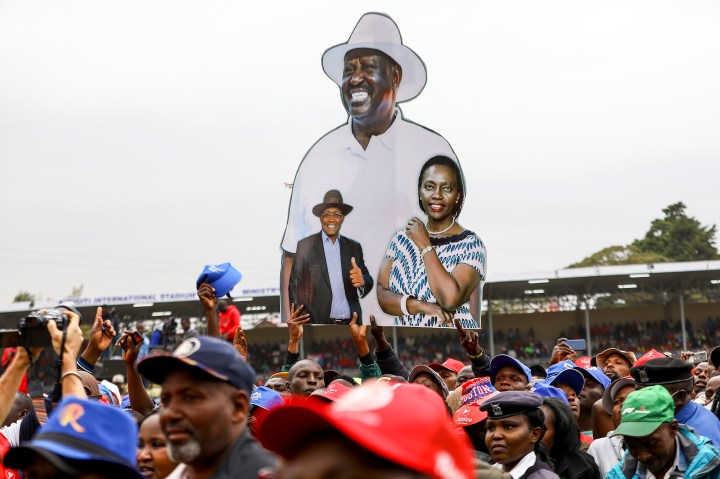TO THE POLLS OP-ED
Kenyan elections — empower the youth instead of inciting violence

Political leaders ought to share the decision-making table with the youth, acknowledging them as agents of change through policy making, as opposed to a means to personal power-driven gain.
Kenya’s highly anticipated presidential election takes place on 9 August 2022. In the lead-up to the elections, the nation’s headlines have been dominated by campaign sagas and political tensions, with the latter bringing to recollection harsh memories from the country’s 2007-2008 post-election period.
The aforementioned period was marked by mass displacement, widespread sexual violence and numerous casualties, with more than 1,200 people killed – it serves as a painful collective memory for the nation.
One cannot help but remember the subtle signs that preceded the civil unrest, including the hate speech and calls for violence incited by political leaders. The youth fell especially victim to this incitement, with reports indicating that 70 % of those who engaged in election-related violence during this period were from this group. At the time, factors such as high unemployment and insufficient civic spaces contributed to the youth’s vulnerability to political violence.
Four presidential candidates have been cleared by the electoral commission for the 2022 Kenyan Elections, namely, David Mwaure Waihiga of Agano Party; Raila Odinga of Azimio la Umoja; William Ruto of Kenya Kwanza and George Wajackoyah of Roots Party.
The issues that defined the affairs 15 years ago have not been laid to rest: Unemployment rates in the country are at the highest they’ve been since 1995 at 5.7%, while the cost of living continues to grow, with inflation reaching upwards of 7%.
Meanwhile, political tensions continue to mount between presidential hopefuls William Ruto and Raila Odinga, with ethnic divisions and the outgoing president’s decision to endorse Odinga as the next president of the Republic, acting as key points of tension. Already there are episodes of incitement of the youth to intimidate and heckle political opponents along the campaign trail, in what remains highly reminiscent of the events leading up to the election-related violence in 2007.
That being said, the strong calls for caution issued to young people amid the current political tension demonstrate commendable progress on this subject.
The Archbishop of the Kisumu Archdiocese in Kisumu County, for instance, has urged the youth to opt for peace and refuse incitement, while civil society has amped up advocacy against youth engagement in political violence. Similarly, social media platforms such as TikTok have made attempts to urge the youth to choose peace via a series of live streams focused on “tolerance, building bridges and active citizenship”.
Indeed, these efforts are an encouraging sign that there is some shift from the status quo. Such efforts should be reinforced, through behavioural change campaigns, and income generation initiatives, but there is also a clear need to build just and democratic institutions and civic spaces that allow the youth to meaningfully engage in politics, thereby promoting sustainable peace.
Such institutions could perhaps strengthen the rule of law and accountability, ensuring that any voter dissatisfaction is addressed through a well-structured, just and independent institution that can uphold democracy and investigate any claims of undemocratic electoral processes, to the merriment of the youth. Furthermore, civic spaces for this subgroup ought to be expanded, for instance through greater efforts to increase youth representation in political institutions, providing them with the resources and skills to mobilise and advocate the future they desire.
In addition to holding political leaders accountable for inciting youth violence, civil society has a large role to play in pushing for and supporting the development of institutions and spaces for youth participation. Political leaders, on the other hand, ought to share the decision-making table with the youth, acknowledging them as agents of change through policy making, as opposed to a means to personal power-driven gain. Indeed, there might even be a space for an institution that is awarded with international jurisdiction to ensure and promote free and fair elections across the globe.
As we ponder all these recommendations, we urge all stakeholders to play their role in promoting peace and encouraging youth participation in positive political engagement. As for the youth, heed caution and play an empowered role in advocating the change you wish to see. DM/MC
This article was authored as a joint effort by: Amy Oloo, Executive Director of the World Federalist Movement/ Institute of Global Policy; Mohammed Ndifuna, human rights defender, peace builder and Director of Justice Access Point, Uganda; Richard Kasu, Director of CFF Ghana and Joy Muthoni, Executive Director of Amani Communities Africa, Kenya. The aforementioned organisations are a consortium working to reduce youth participation in election-related violence in Kenya, Uganda and Ghana.
















 Become an Insider
Become an Insider
Comments - Please login in order to comment.